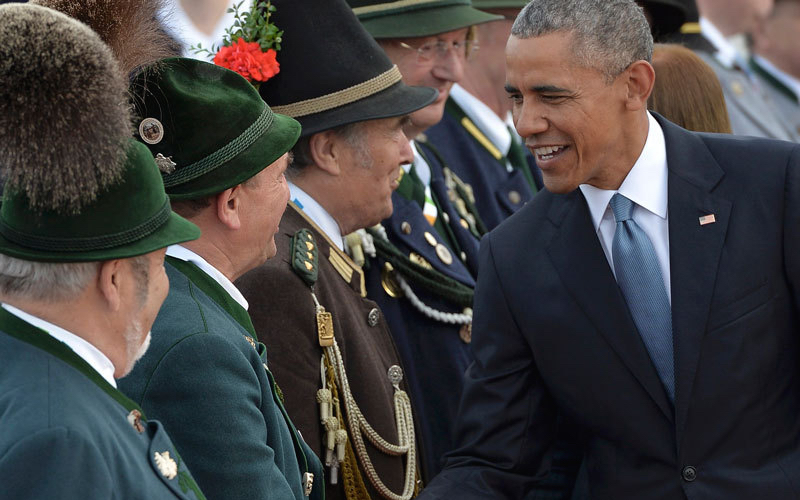
Sanctions Remain Putin’s Primary Punishment
For those seeking a hawkish solution to containing Russian empire building, the high-flying G-7 is not their answer. Military options are not being suggested by the geopolitical side of the conclave in Germany, at least when it comes to Russian expansionism in Eastern Europe.
This confab is about disarming Vladimir Putin’s armed adventurism without overtly firing a shot in his direction. President Obama’s main goal is to win a consensus among partners to extend the life of European Union economic sanctions imposed on Russia. There is little doubt such an unambitious objective will succeed. The White House managed those expectations well before the president arrived in Germany.
“We think that there can be a peaceful, diplomatic resolution to this problem, but it’s going to require that Europe, the United States and the Transatlantic Partnership, as well as the world, stay vigilant and stay focused on the importance of upholding the principles of territorial integrity and sovereignty,” Obama said at a meeting with British Prime Minister David Cameron at a side meeting in Krün.
While there is plenty of frosty chatter at the German luxury retreat, the Cold War rhetoric is being left to Obama’s detractors to offer up elsewhere. A soft posture at the summit does not mean Putin is not still seen a bully who deserves to be punished for annexing Crimea and carrying out a de facto invasion of Ukraine.
Putin has been more than scolded and told to go sit in the corner. Moscow’s propaganda machine can spin a dozen reasons why it does not want to be part of the exclusive club of industrialized nations, but it does not lessen the sting Russia feels from its exclusion from the G-7.
“I don’t think Russia under Vladimir Putin belongs in the G-7. Period,” Canadian Prime Minister Harper told the Associated Press. “Canada would very, very strongly oppose Putin ever sitting around that table again. It would require consensus to bring Russia back and that consensus will just not happen.”
Clearly Putin cannot be judged just by looking into his eyes. He is an agent provocateur, but he is also a bit of raccoon. The EU and U.S. are taking half a step back to give him a chance to crawl out of the corner he finds himself in to avoid having him scratch and claw his way out.
It is a real-world solution, along with the economic sanctions and the well-timed Saudi-driven OPEC global oil glut.
Putin and his oil-soaked oligarchic cronies are being squeezed hard and we should expect it to continue until he pulls back and gives Ukraine a chance to decide its own fate.
It is important for seasoned observers to consider thinking far outside the Cold War box. The West most likely will need to “help” give him a face-saving way to maintain Russian pride without his having to again roll tanks into countries that have shed their Soviet identities in favor of Western-style democracy.
As Kremlinologist Lilia Shevtsova contends, it is important to recognize Moscow’s “humiliation syndrome” that hovers around a once proud empire that saw itself as much more than just a nuclear superpower.
No one is quite sure how far Putin will go to try to demonstrate that Moscow is still a tough guy in his neighborhood, if given an excuse to do so. That danger exists, no matter the motives, whether this condition is caused by legitimate grievances with the West, or the more plausible contrived, self-pity party in which the Kremlin paints itself as the victim.
“The combination of the memory of past victories and injection of a humiliation narrative into the public psyche could produce an explosive mixture,” Shevtsova argued in The American Interest as part of a discussion exploring the Russian incarnation of Weimar Syndrome.
In part, fear-mongering and Western counter-propaganda probably helped create an exaggerated image of the Soviet Union as an economic superpower that sought to impose on the West its compromised, hyper-twisted Stalinist closed-market economics and paranoid totalitarian government system that it called “communism” (even Karl Marx and Vladimir Lenin would deem their Soviet bastard child an impure descendant of their vision for a pro-worker movement and revolution).
At the moment hawkish discourse urging a military response to the threat posed by Russia is rhetoric strewn with impractical solutions, as is the belief that the world’s leading economic powers cannot sustain economic retribution to rein in Putin’s bellicose behavior in Eastern Europe.
Over beer, schnitzel and lederhosen jokes, the leaders of Canada, France, Germany, Italy, Japan, the United Kingdom and the United States will agree it was economic sanctions that brought an oil-centric economy like Iran to the negotiating table, rather than repeated threats of bombing the country into submission. The play seems to be the same for Russia.

